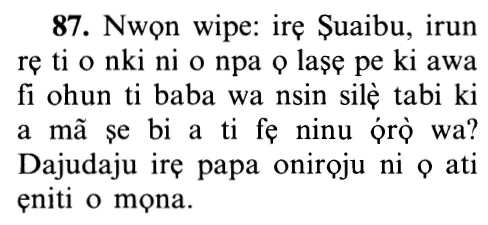11vs87
Select any filter and click on Go! to see results
قَالُواْ يَا شُعَيْبُ أَصَلاَتُكَ تَأْمُرُكَ أَن نَّتْرُكَ مَا يَعْبُدُ آبَاؤُنَا أَوْ أَن نَّفْعَلَ فِي أَمْوَالِنَا مَا نَشَاء إِنَّكَ لَأَنتَ الْحَلِيمُ الرَّشِيدُ
Qaloo ya shuAAaybu asalatuka tamuruka an natruka ma yaAAbudu abaona aw an nafAAala fee amwalina ma nashao innaka laanta alhaleemu alrrasheedu
Index Terms
Click to play
Yoruba Translation

Hausa Translation
Suka ce: "Yã Shu´aibu! Shin sallarka ce take umurtar ka ga mu bar abin da ubanninmu suke bautãwa, kõ kuwa mu bar aikata abin da muke so a cikin dũkiyõyinmu? Lalle, haƙĩƙa kai ne mai haƙuri shiryayye!"
Asbabu n-Nuzuul (Occasions of Revelation)
The Response of Shu`ayb's People
Allah tells;
قَالُواْ يَا شُعَيْبُ ...
They said: "O Shu`ayb!
They said to Shu`ayb, in mockery,
... أَصَلاَتُكَ ...
Does your Salah,
Al-A`mash said,
"This means your reading.''
... تَأْمُرُكَ أَن نَّتْرُكَ مَا يَعْبُدُ آبَاؤُنَا ...
command you that we give up what our fathers used to worship,
meaning the idols and statues.
... أَوْ أَن نَّفْعَلَ فِي أَمْوَالِنَا مَا نَشَؤُا ...
or that we give up doing what we like with our property,
This means, "Should we abandon our practice of lightening the scales because of your statement This is our wealth and we will do with it as we please.''
Al-Hasan said concerning Allah's statement, أَصَلاَتُكَ تَأْمُرُكَ أَن نَّتْرُكَ مَا يَعْبُدُ آبَاؤُنَا (Does your Salah command you that we give up what our fathers used to worship)
"By Allah, this means that his prayer commanded them to abandon what their fathers used to worship.''
At-Thawri said concerning Allah's statement, أَوْ أَن نَّفْعَلَ فِي أَمْوَالِنَا مَا نَشَؤُا (or that we give up doing what we like with our property),
"They were speaking in reference to the paying of Zakah (charity).''
... إِنَّكَ لَأَنتَ الْحَلِيمُ الرَّشِيدُ ﴿٨٧﴾
Verily, you are the forbearer right-minded!
Ibn Abbas, Maymun bin Mihran, Ibn Jurayj, Ibn Aslam, and Ibn Jarir all said,
"These enemies of Allah were only saying this in mockery.
May Allah disfigure them and curse them from ever receiving His mercy. And verily, He did so.''
يقولون له على سبيل التهكم قبحهم الله " أصلاتك " قال الأعمش أي قراءتك " تأمرك أن نترك ما يعبد آباؤنا " أي الأوثان والأصنام أو أن نفعل في أموالنا ما نشاء فنترك التطفيف عن قولك وهي أموالنا نفعل فيها ما نريد قال الحسن في قوله " أصلاتك تأمرك أن نترك ما يعبد آباؤنا" إي والله إن صلاته لتأمرهم أن يتركوا ما كان يعبد آباؤهم وقال الثوري في قوله " أو أن نفعل في أموالنا ما نشاء " يعنون الزكاة " إنك لأنت الحليم الرشيد " قال ابن عباس وميمون بن مهران وابن جريج وأسلم وابن جرير : يقولون ذلك أعداء الله على سبيل الاستهزاء قبحهم الله ولعنهم عن رحمته وقد فعل .
"قالوا" له استهزاء "يا شعيب أصلاتك تأمرك" بتكليف "أن نترك ما يعبد آباؤنا" من الأصنام "أو" نترك "أن نفعل في أموالنا ما نشاء" المعنى هذا أمر باطل لا يدعو إليه داع بخير "إنك لأنت الحليم الرشيد" قالوا ذلك استهزاء
وقرئ " أصلاتك " من غير جمع .
I'raab - grammatical analysis of the Qur'an
«قالُوا» ماض وفاعله والجملة مستأنفة.
«يا» أداة نداء.
«شُعَيْبُ» منادى مبني على الضم في محل نصب على النداء.
«أَصَلاتُكَ» الهمزة للاستفهام وصلاتك مبتدأ والكاف مضاف إليه.
«تَأْمُرُكَ» مضارع فاعله مستتر والكاف مفعوله والجملة خبر.
«أَنْ» ناصبة.
«نَتْرُكَ» مضارع منصوب وفاعله مستتر وأن وما بعدها منصوب بنزع الخافض.
«ما» موصولية مفعول به.
«يَعْبُدُ» مضارع مرفوع.
«آباؤُنا» فاعل ونا مضاف إليه والجملة صلة.
«أَوْ» عاطفة.
«أَنْ» ناصبة.
«نَفْعَلَ» مضارع منصوب وفاعله مستتر والجملة معطوفة.
«فِي أَمْوالِنا» متعلقان بنفعل ونا مضاف إليه.
«ما» موصولية مفعول به.
«نَشؤُا» مضارع فاعله مستتر والجملة صلة.
«إِنَّكَ» إن واسمها والجملة تعليل لا محل لها.
«لَأَنْتَ الْحَلِيمُ» اللام المزحلقة ومبتدأ وخبر الجملة خبر إنك.
«الرَّشِيدُ» خبر ثان.
